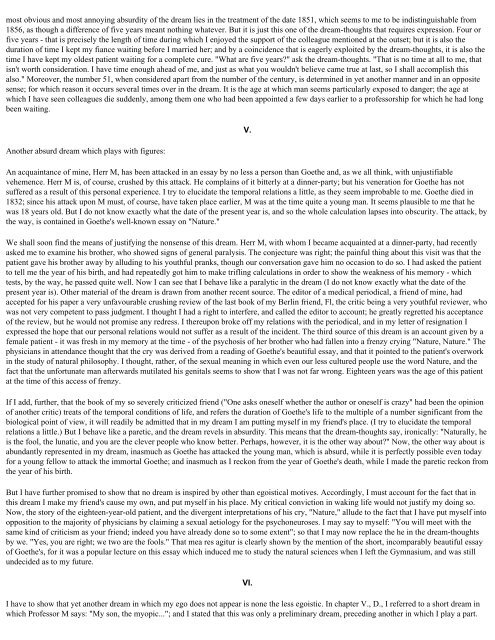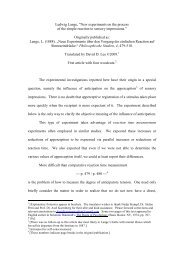The Interpretation Of Dreams Sigmund Freud (1900) PREFACE
The Interpretation Of Dreams Sigmund Freud (1900) PREFACE
The Interpretation Of Dreams Sigmund Freud (1900) PREFACE
You also want an ePaper? Increase the reach of your titles
YUMPU automatically turns print PDFs into web optimized ePapers that Google loves.
most obvious and most annoying absurdity of the dream lies in the treatment of the date 1851, which seems to me to be indistinguishable from<br />
1856, as though a difference of five years meant nothing whatever. But it is just this one of the dream-thoughts that requires expression. Four or<br />
five years - that is precisely the length of time during which I enjoyed the support of the colleague mentioned at the outset; but it is also the<br />
duration of time I kept my fiance waiting before I married her; and by a coincidence that is eagerly exploited by the dream-thoughts, it is also the<br />
time I have kept my oldest patient waiting for a complete cure. "What are five years?" ask the dream-thoughts. "That is no time at all to me, that<br />
isn't worth consideration. I have time enough ahead of me, and just as what you wouldn't believe came true at last, so I shall accomplish this<br />
also." Moreover, the number 51, when considered apart from the number of the century, is determined in yet another manner and in an opposite<br />
sense; for which reason it occurs several times over in the dream. It is the age at which man seems particularly exposed to danger; the age at<br />
which I have seen colleagues die suddenly, among them one who had been appointed a few days earlier to a professorship for which he had long<br />
been waiting.<br />
Another absurd dream which plays with figures:<br />
V.<br />
An acquaintance of mine, Herr M, has been attacked in an essay by no less a person than Goethe and, as we all think, with unjustifiable<br />
vehemence. Herr M is, of course, crushed by this attack. He complains of it bitterly at a dinner-party; but his veneration for Goethe has not<br />
suffered as a result of this personal experience. I try to elucidate the temporal relations a little, as they seem improbable to me. Goethe died in<br />
1832; since his attack upon M must, of course, have taken place earlier, M was at the time quite a young man. It seems plausible to me that he<br />
was 18 years old. But I do not know exactly what the date of the present year is, and so the whole calculation lapses into obscurity. <strong>The</strong> attack, by<br />
the way, is contained in Goethe's well-known essay on "Nature."<br />
We shall soon find the means of justifying the nonsense of this dream. Herr M, with whom I became acquainted at a dinner-party, had recently<br />
asked me to examine his brother, who showed signs of general paralysis. <strong>The</strong> conjecture was right; the painful thing about this visit was that the<br />
patient gave his brother away by alluding to his youthful pranks, though our conversation gave him no occasion to do so. I had asked the patient<br />
to tell me the year of his birth, and had repeatedly got him to make trifling calculations in order to show the weakness of his memory - which<br />
tests, by the way, he passed quite well. Now I can see that I behave like a paralytic in the dream (I do not know exactly what the date of the<br />
present year is). Other material of the dream is drawn from another recent source. <strong>The</strong> editor of a medical periodical, a friend of mine, had<br />
accepted for his paper a very unfavourable crushing review of the last book of my Berlin friend, Fl, the critic being a very youthful reviewer, who<br />
was not very competent to pass judgment. I thought I had a right to interfere, and called the editor to account; he greatly regretted his acceptance<br />
of the review, but he would not promise any redress. I thereupon broke off my relations with the periodical, and in my letter of resignation I<br />
expressed the hope that our personal relations would not suffer as a result of the incident. <strong>The</strong> third source of this dream is an account given by a<br />
female patient - it was fresh in my memory at the time - of the psychosis of her brother who had fallen into a frenzy crying "Nature, Nature." <strong>The</strong><br />
physicians in attendance thought that the cry was derived from a reading of Goethe's beautiful essay, and that it pointed to the patient's overwork<br />
in the study of natural philosophy. I thought, rather, of the sexual meaning in which even our less cultured people use the word Nature, and the<br />
fact that the unfortunate man afterwards mutilated his genitals seems to show that I was not far wrong. Eighteen years was the age of this patient<br />
at the time of this access of frenzy.<br />
If I add, further, that the book of my so severely criticized friend ("One asks oneself whether the author or oneself is crazy" had been the opinion<br />
of another critic) treats of the temporal conditions of life, and refers the duration of Goethe's life to the multiple of a number significant from the<br />
biological point of view, it will readily be admitted that in my dream I am putting myself in my friend's place. (I try to elucidate the temporal<br />
relations a little.) But I behave like a paretic, and the dream revels in absurdity. This means that the dream-thoughts say, ironically: "Naturally, he<br />
is the fool, the lunatic, and you are the clever people who know better. Perhaps, however, it is the other way about?" Now, the other way about is<br />
abundantly represented in my dream, inasmuch as Goethe has attacked the young man, which is absurd, while it is perfectly possible even today<br />
for a young fellow to attack the immortal Goethe; and inasmuch as I reckon from the year of Goethe's death, while I made the paretic reckon from<br />
the year of his birth.<br />
But I have further promised to show that no dream is inspired by other than egoistical motives. Accordingly, I must account for the fact that in<br />
this dream I make my friend's cause my own, and put myself in his place. My critical conviction in waking life would not justify my doing so.<br />
Now, the story of the eighteen-year-old patient, and the divergent interpretations of his cry, "Nature," allude to the fact that I have put myself into<br />
opposition to the majority of physicians by claiming a sexual aetiology for the psychoneuroses. I may say to myself: "You will meet with the<br />
same kind of criticism as your friend; indeed you have already done so to some extent"; so that I may now replace the he in the dream-thoughts<br />
by we. "Yes, you are right; we two are the fools." That mea res agitur is clearly shown by the mention of the short, incomparably beautiful essay<br />
of Goethe's, for it was a popular lecture on this essay which induced me to study the natural sciences when I left the Gymnasium, and was still<br />
undecided as to my future.<br />
I have to show that yet another dream in which my ego does not appear is none the less egoistic. In chapter V., D., I referred to a short dream in<br />
which Professor M says: "My son, the myopic..."; and I stated that this was only a preliminary dream, preceding another in which I play a part.<br />
VI.



